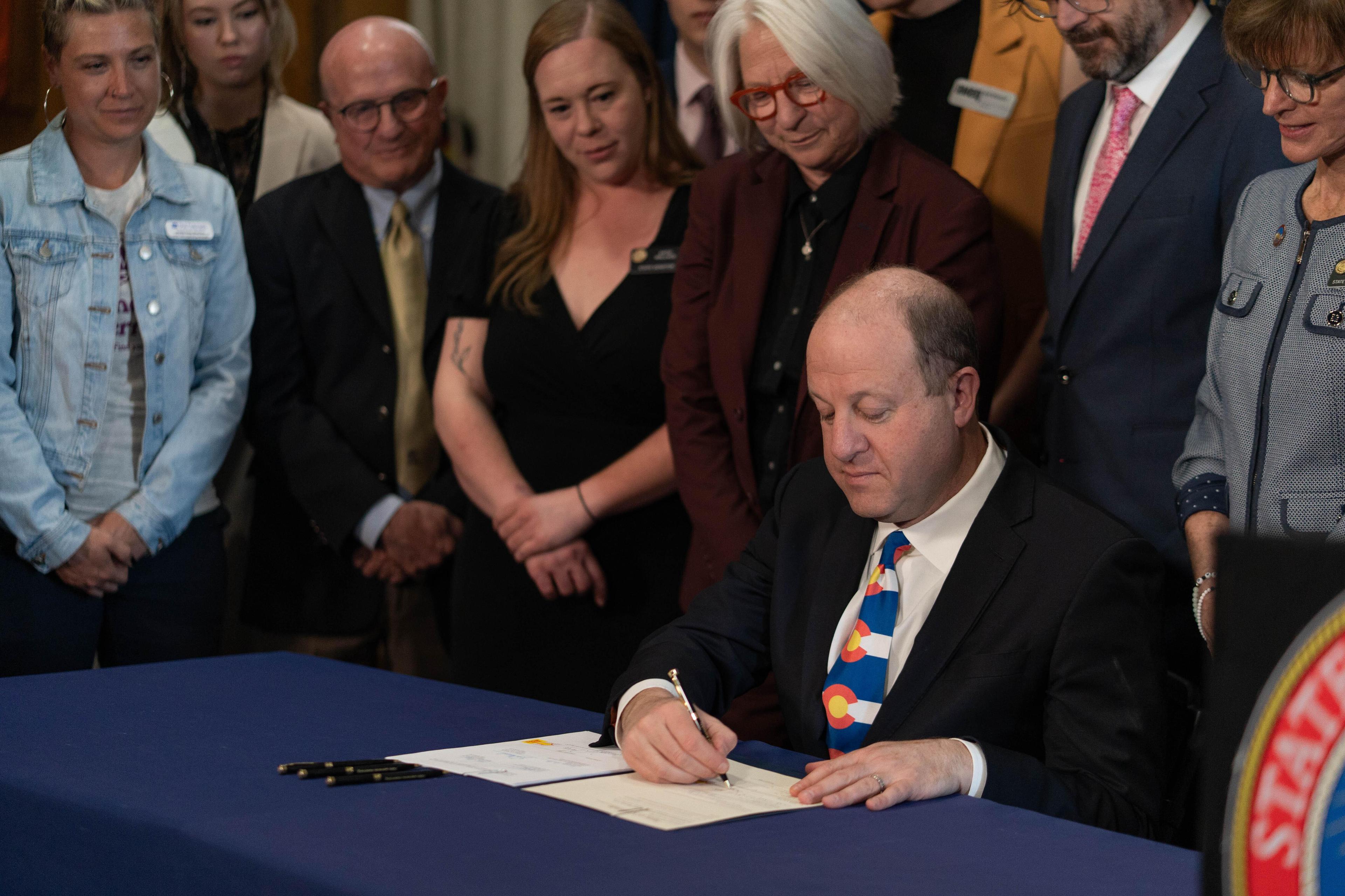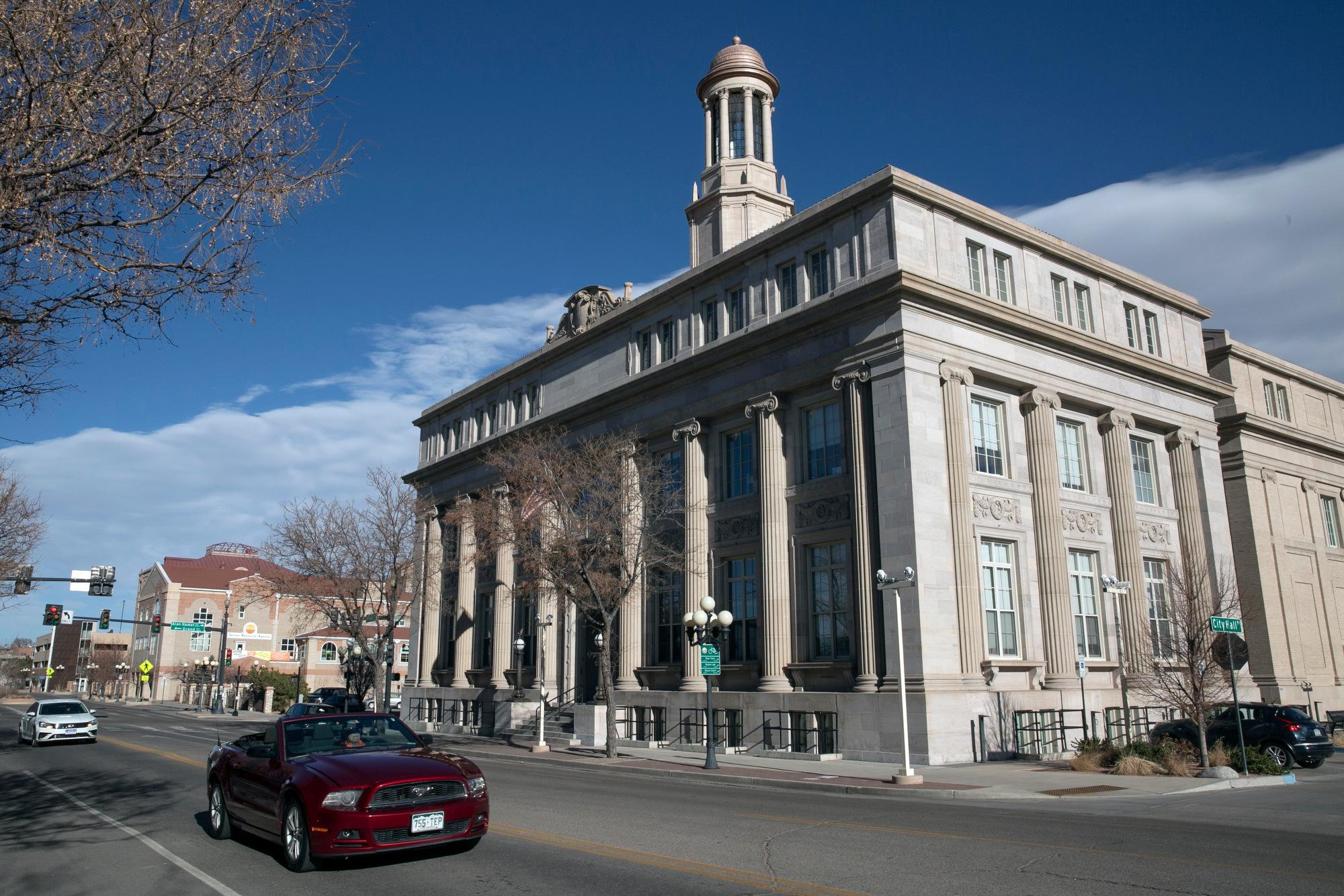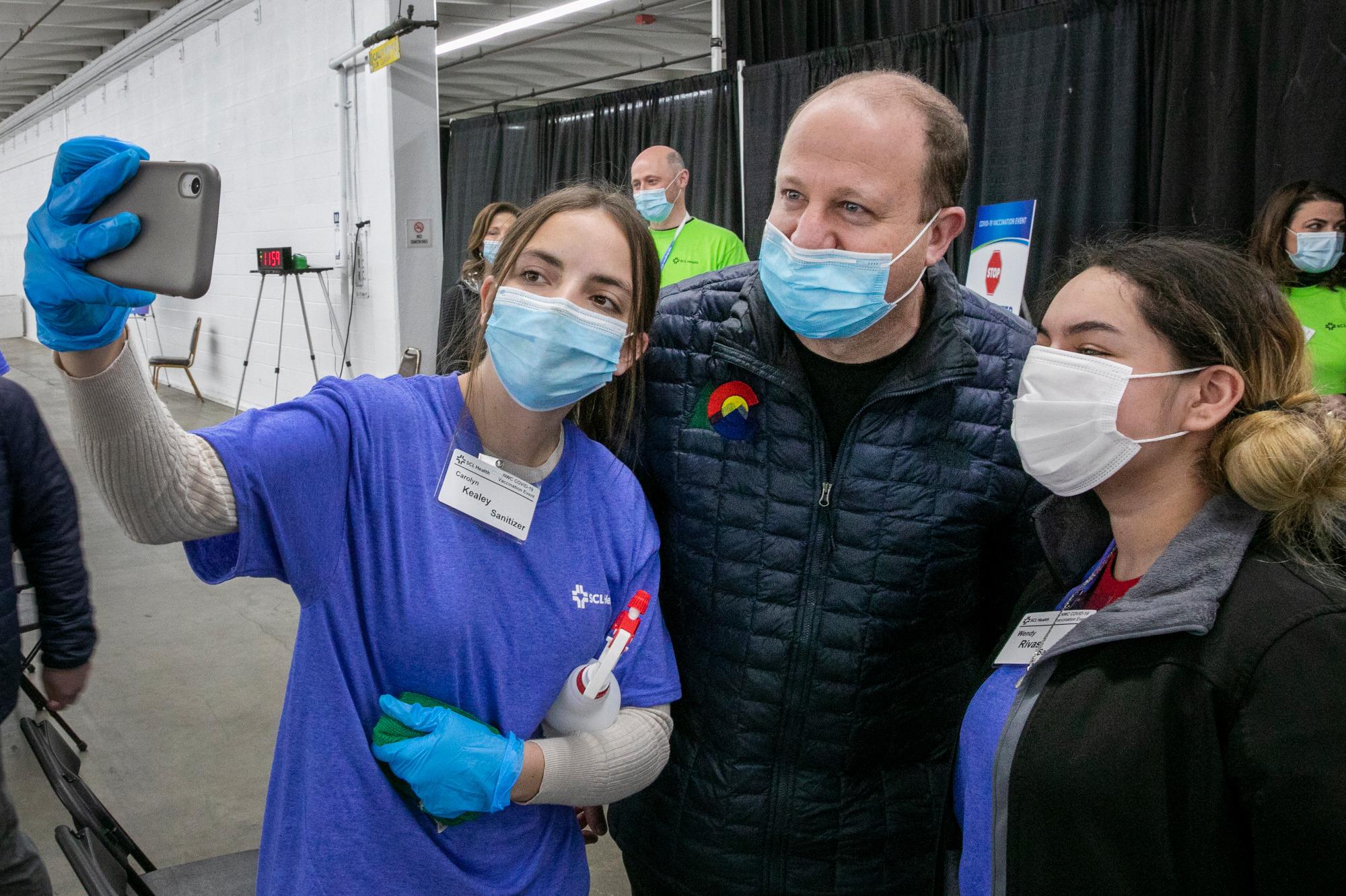
One year into the pandemic, Gov. Jared Polis has stood in front of television cameras hundreds of times, more frequently than maybe any Colorado governor in history. And each time he’s addressed the state to release new data, provide updates, and implore Coloradans to stay safe, he’s known exactly who his closest observer will be.
“My mom always watches,” Polis said. And 76-year-old Susan Polis Schutz is no passive viewer. The governor’s communications director has gotten used to instantaneous feedback. “My mom always texts in, if there's any problem at all. Like, ‘it showed the background too long,’ or ‘there was a part you couldn't hear.’ My mom will be quick to get any of those notes into our team within a matter of seconds.”
It’s just one way the governor’s personal and work lives have blurred into each other over this unprecedented year, an experience familiar to many Coloradans.
CPR News recently spent time with Polis and his senior staff over the course of several days to observe their high-level planning and logistics meetings and get a better sense of how they’ve managed the crisis.
Nearly 6,000 Coloradans have died due to the pandemic as of March 3, and it’s thrust Polis into the center of an endlessly unfolding crisis. It’s not a scenario he ever imagined when he ran for the job.
“You know, somebody has to be governor and I happened to be here at this time, so I was just going to do my best to make the most informed decisions I can,” he said.
Like governors across the country, Polis has exercised extraordinary powers during the public health emergency. He’s issued hundreds of executive orders — closing businesses, mandating masks, protecting renters and activating the national guard, among many other things — yet Polis believes persuasion may be more important to taming the pandemic than concrete policies. All of those scores of broadcast briefings have been a chance to provide hard facts, cajole, explain, and at times browbeat the public into doing what he hopes they will do.
“The policies matter a bit, and people focus so much on those,” Polis said. “Do you tell people they have to wear masks? Do you close down? What capacity do you have at restaurants? But what really matters is, are people wearing masks?”
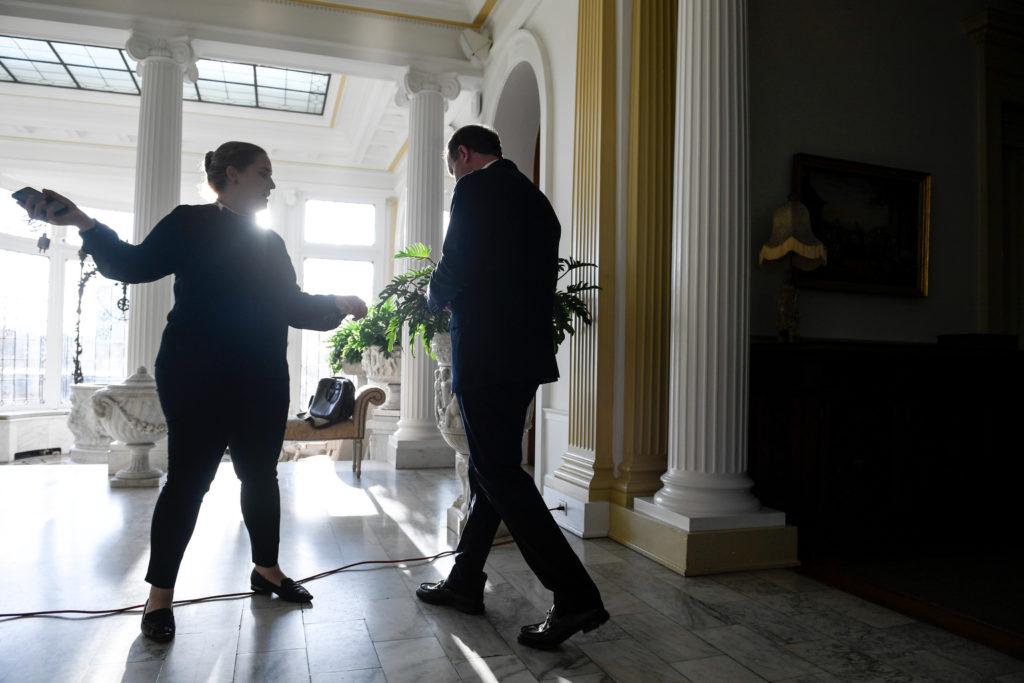
Late nights in the home office
These days Polis has mostly abandoned his office on the first floor of the state Capitol. He works remotely from his home in Boulder where he lives with his partner Marlon Reis and their two young children.
He said his days start early and end around midnight. Normal business hours are full of briefings and planning calls, evenings are when he has time to read scientific journals, think deeply, and make decisions.
“That's when I can go through all the different graphs and charts and spreadsheets and provide comments on stuff,” he said. “Usually around 10, 11 o'clock at night is when I'm productive and getting all my memos out.”
About twice a week he makes the trip to the Governor’s mansion, just a few blocks from the state Capitol, for his now-familiar media briefings. The mansion is filled with ornate furniture and decor — one reason he doesn’t live there. “With two young kids, you'd kind of be asking for trouble.”
Ahead of each briefing he meets with a few of his staff in a nondescript conference room on an upper floor to go over what he wants to cover.
“That's one of my few, personal interactions with staff that I've had over the last year.”
A small kitchen just off the meeting room has supplies for the days he drops in: his snack of choice — beef jerky — and an array of caffeinated drinks — Red Bull for a pick-me-up on those mornings when he’s awake at 4 a.m., sodas and kombucha. The fridge also holds five beers courtesy of his predecessor, former governor John Hickenlooper.
“It's still here because he left it and I don't touch it.” Polis said he drinks alcohol about twice a year.
It’s a short walk outside to a separate carriage house, the staging area for briefings, set up with spaced out chairs and a simple backdrop of flags and the state seal. It took staff a while to figure out the best way to produce these press conferences: incorporating a sign language interpreter and bringing in charts and remote guests.
“We weren't really set up to do this, but out of necessity, we said, ‘we’ve got to have a good production value.’ You don't want to have some crappy looking thing you can’t hear or people just won't listen.”
Polis as a boss
Interviewing Polis behind the scenes, and observing him in meetings over the past year, he doesn’t come across much different than the person Coloradans see through the briefing room camera. He’s detailed and numbers-oriented. Meetings start and end on time, and they often stack up to fill most of each day, even as he and his staff juggle other tasks.
Back in March when the state was scrambling to get enough respirators, masks and COVID tests, and Polis was signing orders that shuttered the state’s economy, the governor didn’t appear overly emotional or show signs of stress. He does remember it as a time of intense pressure, though.
“Literally you had every state competing against one another and often the federal government competing against us,” he recalled.
Polis works with a close inner circle. His chief of staff Lisa Kaufmann is his longest-serving employee and most trusted political advisor. Colleagues describe her as the person who knows Polis better than almost anyone, and she has said their relationship is so second nature now that it’s a bit of a “mind meld.”
Kaufmann describes her boss as “always calm and extremely rational, and that could be a little bit maddening at times ... He's always on the more optimistic side of any scenario. He always sees the glass half full. But he's also very open, and really welcomes debate.”
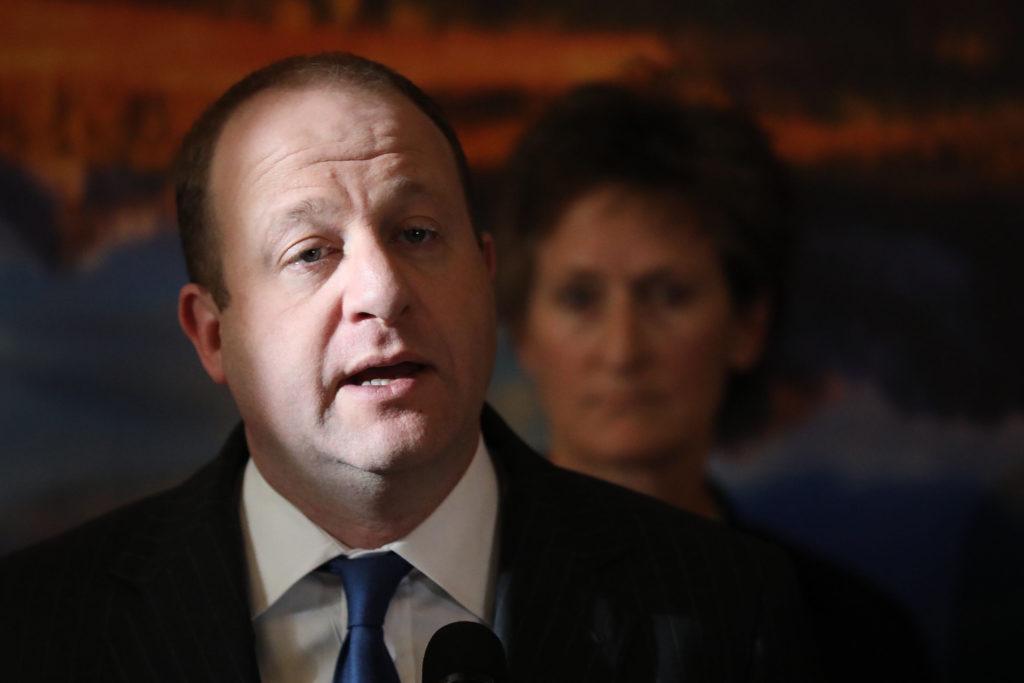
In late March of last year, Polis put the state under a restrictive Stay At Home order. Deciding how long to keep it in place, Kaufmann said, was one of the toughest decisions the administration faced during the pandemic. They had to weigh the need to protect public health and save lives against the damage the order did to people’s finances and emotional well being. Polis wanted to lift the order sooner than some of his top staff.
“He kept saying to us, ‘you know, this has to be sustainable’ and a stay-at-home was not sustainable,” Kaufmann said.
Ultimately Polis went with the timeline he thought was best, allowing the order to expire after just over a month. Kaufmann said he made his decision based on data that showed proper social distancing would have the same effect as the stay at home order.
“You can't make an emotional plea to the governor,” she said. “There's times in which team members are scared and emotional during periods of this, and the governor is really mission-focused and data-driven.”
And when it’s time for a decision, Polis often makes them quickly. It’s a pace that can take some getting used to, according to Stan Hilkey, head of the Colorado Department of Public Safety.
“I worked for different leaders through the years, and led myself in different ways,” said Hilkey. “His decisiveness and this sort of rapid decision-making, rapid ability to uptake information and make a decision, was certainly uncomfortable for me, because I've been a person who wants to be very critically thinking about stuff.”
But Hilkey said he now feels grateful for that decisiveness, especially during the pandemic, when the data on infection rates always lagged about two weeks behind. Each time new information came in, Hilkey said, Polis had to act quickly to avoid adding any more delay.
COVID-19 was far from the only challenge the administration faced in the past year. Throughout the summer, demonstrators took to the streets in widespread protests against racial injustice, with a few turning destructive. From August onward, the state burned with a wildfire season like no other. And of course, in the face of all that, the regular responsibilities of the job continued too.
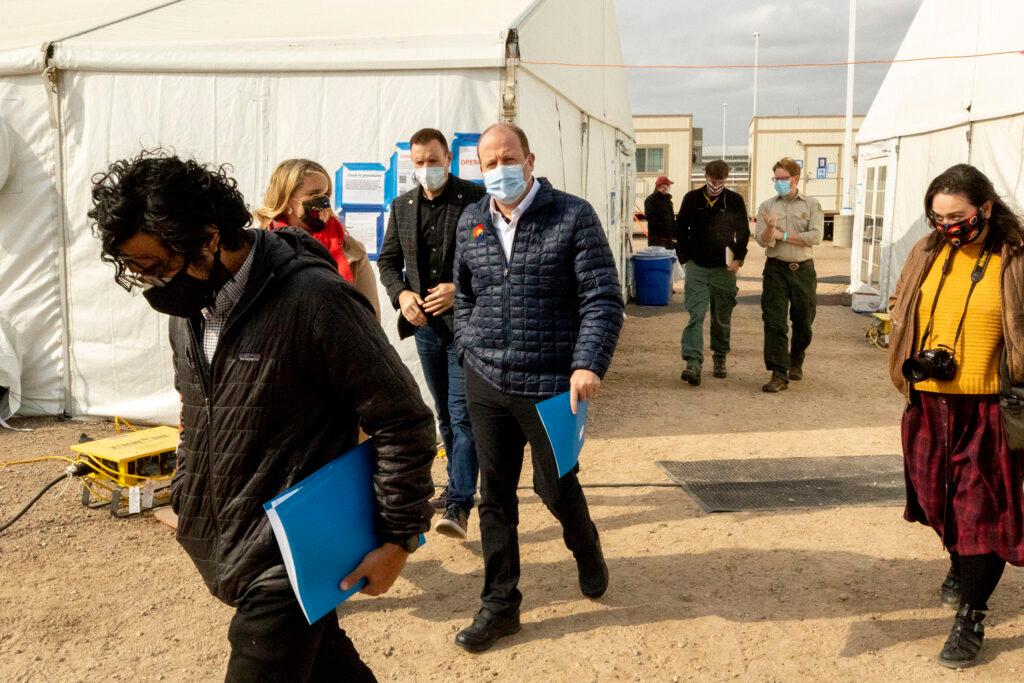
“It's become a year where everything has been sort of dwarfed by the presence of this pandemic and virus. As governor, I had to become an expert in this and spend half my time on this,” Polis said. But “there's still a lot of other things, right? Roads need to be plowed and education goes on, and all these things.”
Senior advisor Rick Palacio remembers one day in particular last fall that he said will haunt him for the rest of his life.
“I got an email notification from Human Services that a one-year-old in foster care in Pueblo had been hospitalized and essentially murdered by his foster parents,” Palacio recalled.
The news came on a typically busy day as he and other staff tried to manage wildfires and the pandemic.
“It just really was like a concrete brick had just been dropped onto my head: this sort of realization that, yes, there are crises going on, but there's still this tremendous amount of individual suffering that still is happening.”
A year to forget
Since the pandemic began, Polis has faced his fair share of both praise and criticism. Some local health departments have complained that they’ve been left out of decisions and caught off guard by policy changes. The ACLU tried to sue him personally for not doing enough to protect prisoners from the virus.
Opponents of Polis’ policies organized anti-lockdown protests throughout the year and mounted yet another unsuccessful effort to recall him. Across Colorado, public health workers faced threats and harassment for implementing state and local COVID restrictions. But despite the turmoil, anger and uncertainty in Colorado and across the country, Polis has not faced widespread public backlash like some governors.
Lawmakers in both political parties say publicly and privately that they don’t envy the decisions Polis has had to make.
“The governor didn't run to tackle this type of pandemic,” said Democratic Speaker of the House Alec Garnett. “I think he's really stepped up and he's really worked around the clock on behalf of Coloradans.”
Republican lawmakers have pushed back against Polis’ broad use of executive powers and have argued the legislature should take a bigger role in future emergencies. However, Republican Senate Minority Leader Chris Holbert has also been careful not to be too harsh in his critiques.
“This isn't to point fingers at Gov. Polis or his administration, but the past 11 months is my first experience in a long term, prolonged statewide disaster emergency, and it happened to be over a pandemic. But people have asked, where is our legislature?” Holbert said.
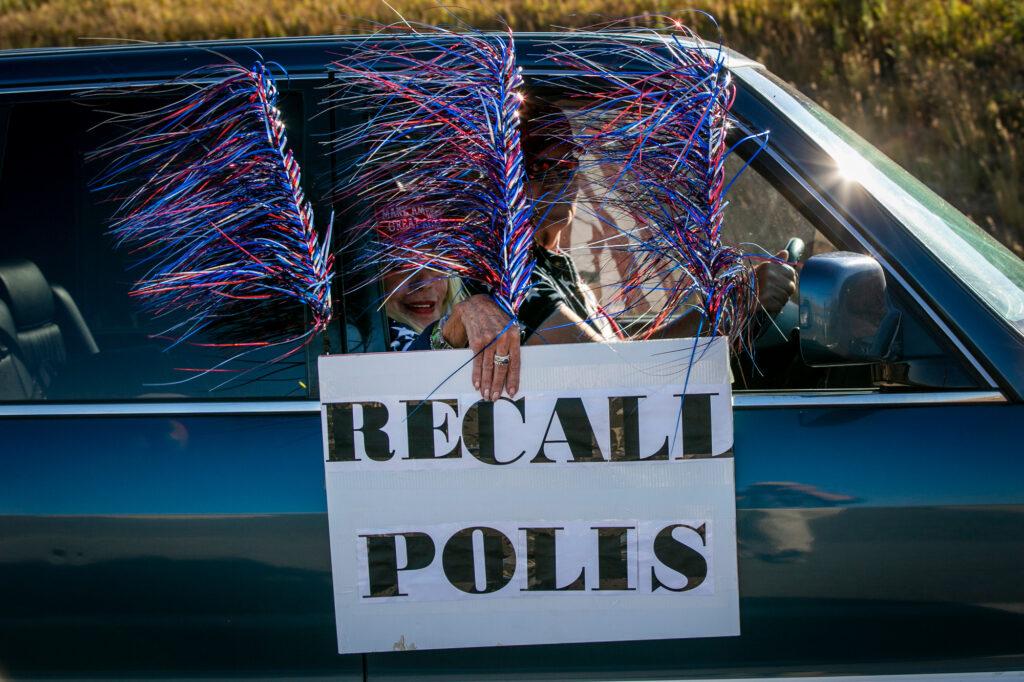
When asked what he’ll remember most from 2020, Polis said he'd rather not remember it at all.
“This is a year that everybody, especially governors, can't wait to forget, just a horrible year,” Polis said.
The toughest time for him personally came in December, when he and Reis both contracted COVID-19. Polis said he lost his taste and smell and felt a bit under the weather. Reis’ case was more severe; he ran a fever and stayed in bed for a few days. After a week Polis thought they were almost through it, that’s when Reis got worse.
“We had these little, you know, home oxygenator things they usually get people with COVID. It went down from normally 95, 85, 84. So they said you better come in.”
“I hadn't driven in probably a year because [State Patrol] don’t like their governor driving. They kind of discourage it,” Polis said. But in this case, he insisted on taking Reis to the hospital himself. “I was feeling fine, but not a hundred percent. But obviously I didn't want to expose our troopers to COVID.”
Polis then experienced something familiar to a lot of parents during the pandemic: the struggle to keep working with his kids underfoot.
“The kids didn't leave the house. We were all under quarantine and it's hard to keep a nine-year-old and a six-year-old inside. And I still had to be working as governor as well,” he said. “That was certainly the hardest time for me.”
Vaccines bring new hope, and new challenges
As the one year anniversary of the pandemic arrives in Colorado, Polis is yet again in the middle of an enormous logistical challenge: this time the roll out of COVID-19 vaccines.
In its early stages, the process left many confused and frustrated. And his decisions about who to prioritize for vaccines — putting grocery workers ahead of restaurant employees, and not fast-tracking prisoners or the homeless, for instance — have faced criticism.
However, Polis touts that Colorado has managed to vaccinate 70 percent of people older than 70. It’s also among the top tier of states in terms of the percentage of vaccine doses it’s received that have been administered to people.
On a daily basis, the governor’s administration is busy ordering doses; tracking and managing vaccine sites; monitoring new variants of the disease; and trying to address persistent inequities over which Coloradans are getting the vaccine. Yet despite the difficulties, Polis said it’s not a bad place to be.
“Certainly (it’s) a more fun thing to contemplate than the dark days of the pandemic and hospital surges and (questions like) ‘where are these extra beds going to be and how are we going to fit all the patients?’ That's a horrible, horrific thing to consider.”
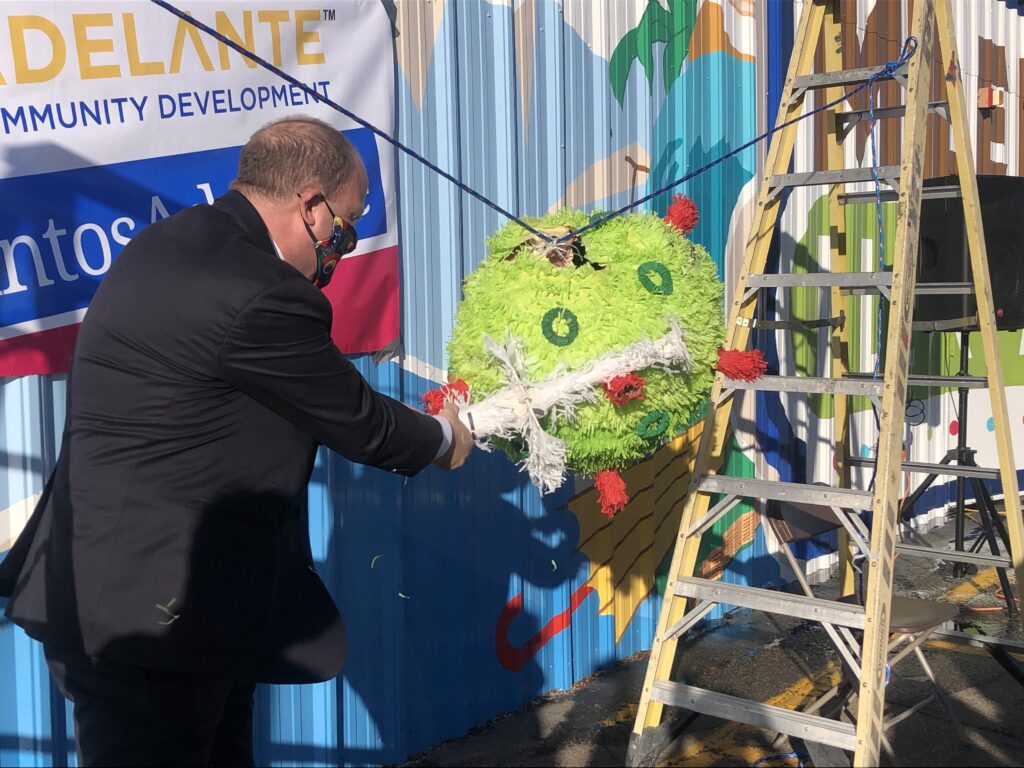
Polis does see a few good things coming from this incredibly difficult year. He thinks remote work and telecommuting have led to efficiencies. And families have found new ways to stay connected while apart.
He recently attended a cousin’s virtual bar mitzvah. His parents have received their first dose of the vaccine and he’s looking forward to when they can see their grandchildren again in person.
“We've really pushed the limits of virtual — certainly FaceTime and Zoom — and not just for work, but in our personal lives,” he said.
And there have been moments of levity. On a recent visit to a vaccine clinic in Adams County, volunteers presented Polis with a piñata in the shape of the COVID-19 virus. Instead of a stick, they handed him a large mock-syringe.
In front of the laughing crowd, Polis whacked at the piñata again and again, trying to break it apart, until eventually one of his staffers had to pull him away.

